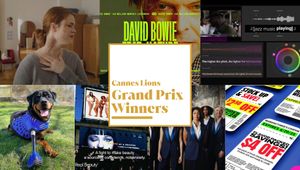
Cannes Jury Spotlights from VMLY&R: Wayne Best

At Cannes Lions, the world’s premier festival celebrating creative excellence, thousands of entries pour in from countries worldwide. Behind the scenes, a carefully selected panel of judges review the work and determine which will ultimately take home a coveted Cannes Lion.
Little Black Book is spotlighting creatives across the VMLY&R network who are joining the ranks of the industry’s most recognised and respected creative professionals to judge top-tier work at this year’s Cannes Lions Festival.
Wayne Best, chief creative officer of VMLY&R New York and Pharma Lions juror, has a history of creating engaging work that is entertaining as well as effective.
While working on Verizon, he played a pivotal role in the Cannes Lions-winning work ‘The Team That Wouldn’t Be Here’ for first responders. His Walmart campaign ‘The Receipt’ for the Oscars and ‘Famous Cars’ film for the Super Bowl effectively shifted perceptions of the brand. For Macy’s, he created the CBS 30-minute animated holiday special ‘Yes, Virginia,’ which has been running in primetime for the past decade.
In addition to his position as the CCO of VMLY&R NY, he leads global creative for the Dell Technologies account. In a few short years, he has propelled the brand to new places with groundbreaking campaigns such as the Unseen Ballet project and the voice banking effort, where he brought Dell, Intel and the MND Association together to create ‘I Will Always Be Me.’ The latter garnered the prestigious Grand Prix in Pharma at the 2022 Cannes Lions.
Wayne has served as the jury chair for the Art Director’s Club Hybrid awards, which honour the most innovative and game-changing work. Furthermore, he has lent his expertise as a judge for esteemed awards such as The One Show and Cannes Lions. He has dedicated time as chair of the Ad Council’s Creative Review Committee and has contributed his insights and knowledge to many panels at the American Association of Advertising Agencies (4A’s).
Q> How do you spot Cannes-winning work?
Wayne> I can spot winning work when something makes radical sense but is completely unexpected. Great Cannes-worthy ideas can be explained simply, but usually have a lot of depth. They make sense for the brand. They challenge you to think or to feel something. They are strategically sound. They are insightful. And you “just get it” the moment you see it. It’s like a magic trick where you are caught off guard, wonderfully surprised, and left thinking, “How the hell did they do that?!?”
Q> What makes you passionate about the category you are judging?
Wayne> Pharma has spent some time sitting in the corner and being ignored. Most creatives cared more about doing ads for candy bars and soda and tacos. Yet the products and services in the pharma and health space are far more meaningful to people’s lives. I get it, pharma ads are complex. There are more rules and regulations. Quite frankly, it’s hard. That said, when you do something good in pharma, it is more meaningful and fulfilling. You’ve actually changed someone’s life.
Q> What do you hope to take away from judging at Cannes 2023?
Wayne> I’m hoping to walk away feeling bummed out. Wishing I had done all the great work we awarded. I have never been excited about winning a prize for advertising. What excites me about Cannes is seeing the bar get raised again and again, pushing all of us to try harder, be smarter, and take more chances. If the work is great and the industry shows up big, I’ll happily walk away in a jealous rage.
Q> What do you think will be the biggest themes at this year’s festival?
Wayne> Artificial intelligence will obviously be a big topic, especially amidst the writer’s strike in Hollywood. The tech itself doesn’t worry me. What worries me are the uncreative people who think it can replace the type of thinking we do every day. I’m not sure how much of it will end up in the work we judge, especially in pharma, but I’m certain it will be a hot conversation.
I think we will continue to judge work more and more based on the impact it has, further eliminating scam ads and “made for the shows” stunts. It has to be real work for real clients for it to win. This doesn’t mean purpose-driven work will suffer, it just needs to be made for big organisations and to have made a difference, at scale.
Q> What does creativity mean to you? OR what does the future of creativity look like?
Wayne> Creativity, at least in marketing, is simply finding an unexpected solution to a real problem. How it is changing and increasing in complexity. In the ‘80s, a clever pun was enough. 20 years ago, it took a really smart idea with impeccable craft to be the best creative in the world. Now, creativity needs to be connected to a big brand, it needs to work across mediums, it needs to tap into culture, it needs a PR element and often an innovation in technology. To do that, you need to align many people across different companies to execute your ideas. Which means creatives can no longer work in a vacuum. I think the best creatives in the future will not only be the ones with great ideas, but the ones who are willing to leave their egos at the door and have the confidence to listen to others and understand that this is now a team sport. They also say a camel is a racehorse designed by a committee. So that means you need to shepherd the idea through the process using radical articulation so everybody understands the idea and constantly persuades others to build on it without letting them water it down. And that is a lot harder than writing a pun.















